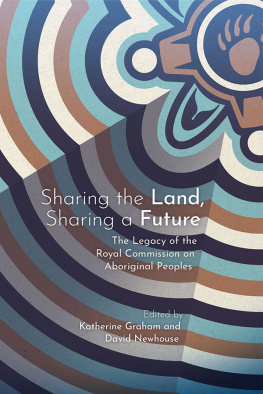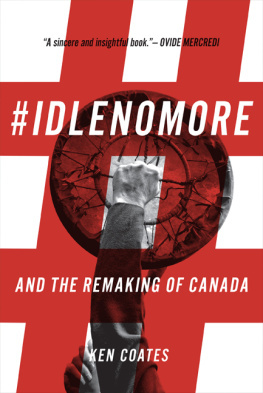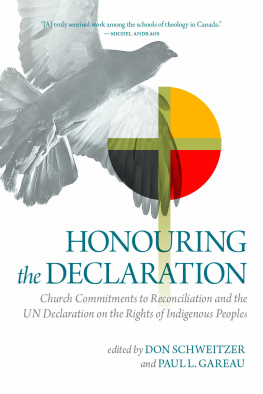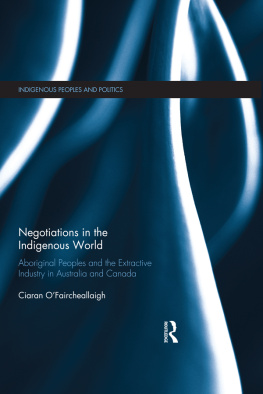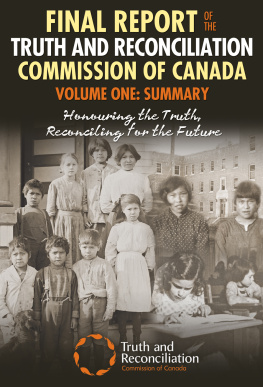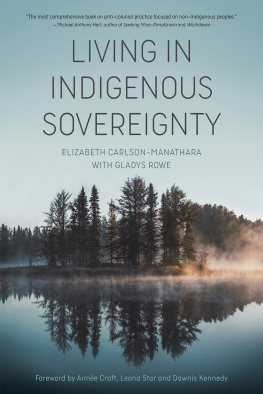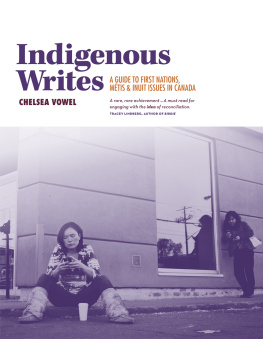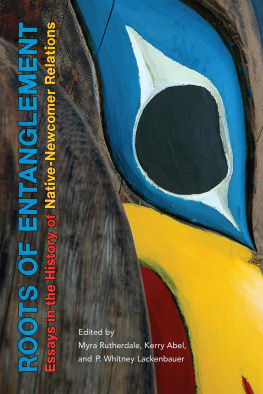Sharing the Land,
Sharing a Future
Perceptions on Truth and Reconciliation
ISSN 2371-347x
5 Did You See Us? Reunion, Remembrance, and Reclamation at an Urban Indian Residential School, by Survivors of the Assiniboia Indian Residential School
4 Sharing the Land, Sharing a Future: The Legacy of the Royal Commission on Aboriginal Peoples, edited by Katherine Graham and David Newhouse
3 Decolonizing Discipline: Children, Corporal Punishment, Christian Theologies, and Reconciliation, edited by Valerie E. Michaelson and Joan E. Durrant
2 Pathways of Reconciliation: Indigenous and Settler Approaches to Implementing the TRCs Calls to Action, edited by Aime Craft and Paulette Regan
1 A Knock on the Door: The Essential History of Residential Schools from the Truth and Reconciliation Commission of Canada, with a foreword by Phil Fontaine
Sharing the Land,
Sharing a Future
Edited by Katherine A.H. Graham and David Newhouse
Sharing the Land, Sharing a Future:
The Legacy of the Royal Commission on Aboriginal Peoples
The Authors 2021
25 24 23 22 21 1 2 3 4 5
All rights reserved. No part of this publication may be reproduced or transmitted in any form or by any means, or stored in a database and retrieval system in Canada, without the prior written permission of the publisher, or, in the case of photocopying or any other reprographic copying, a licence from Access Copyright, www.accesscopyright.ca, 1-800-893-5777.
University of Manitoba Press
Winnipeg, Manitoba, Canada
Treaty 1 Territory
uofmpress.ca
Cataloguing data available from Library and Archives Canada
Perceptions on Truth and Reconciliation, ISSN 2371-347x ; 4
ISBN 978-0-88755-868-9 (paper)
ISBN 978-0-88755-870-2 (pdf)
ISBN 978-0-88755-869-6 (epub)
ISBN 978-0-88755-917-4 (bound)
Cover and interior design by Vincent Design
Printed in Canada
The University of Manitoba Press acknowledges the financial support for its publication program provided by the Government of Canada through the Canada Book Fund, the Canada Council for the Arts, the Manitoba Department of Sport, Culture, and Heritage, the Manitoba Arts Council, and the Manitoba Book Publishing Tax Credit.
Contents
Marlene Brant Castellano and Frederic Wien
Katherine A.H. Graham and David Newhouse
Frances Abele, Erin Alexiuk, Satsan (Herb George), and Catherine MacQuarrie
Yvonne Boyer, Jose Lavoie, Derek Kornelsen, and Jeff Reading
Jo-ann Archibald Qum Qum Xiiem and Jan Hare
Jennifer S. Dockstator, Jeff S. Denis, Frederic Wien, Grard Duhaime, Mark S. Dockstator, David Newhouse, Wanda Wuttunee, Charlotte Loppie, John Loxley, Warren Weir, Eabametoong First Nation, Misipawistik Cree First Nation, Opitciwan Atikamekw First Nation, Sipeknekatik First Nation, and Titqet
Wanda Wuttunee, Frederic Wien, and David Newhouse
Caroline L. Tait, Devon Napope, Amy Bombay, William Mussell, First Peoples First Person, and Canadian Depression Research and Intervention Network
Carrie Bourassa, Eric Oleson, Sibyl Diver, and Janet McElhaney
Cindy Blackstock
Jonathan Dewar
Lynne Davis and Chris Hiller
Aaron Franks
Daniel Sale and Carole Lvesque
Michael Adams, The Environics Institute
Katherine A.H. Graham and David Newhouse
Foreword
We Are All Here To Stay: The Sharing The Land, Sharing A Future Forum Marking The Twentieth Anniversary Of RCAP
Marlene Brant Castellano and Frederic Wien
Co-Chairs of the Oversight Committee for Sharing the Land, Sharing a Future
The concluding volume of the report of the Royal Commission on Aboriginal Peoples (RCAP) (1996) was titled Renewal: A Twenty-Year Commitment. The report anticipated that, if the agenda for institutional change and investment mapped out by RCAP was launched immediately, then benefits would accrue to Aboriginal peoples and the nation as a whole. Within ten years, levels of social well-being, reduction in costs of dependency, and increased productivity would visibly offset expenditures. By the twentieth year, there would be a net dividend to Canada as a result of the equitable participation of healthy, educated, empowered Aboriginal nations.
As the twentieth anniversary of RCAP approached, the RCAP body of work had almost disappeared from public view. The enormous legacy of information assembled in published reports, research studies, intervenor briefs from NGOs, Aboriginal organizations and communities, and transcripts of extensive public hearings was inaccessible, lodged in digital archives incompatible with current software. Most recommendations had been ignored.
The report of the Truth and Reconciliation Commission (TRC) in 2015 acknowledged that RCAP had set out a bold new path to change the very foundation of Canadas relationship with Aboriginal peoples and declared that the country has a rare second chance to seize a lost opportunity for reconciliation. The TRC report frequently cited RCAP documents to add clarity and depth to its own analysis, and the calls to action (CTA) echoed many of the recommendations made two decades earlier, including CTA 45 for a new Royal Proclamation to be developed jointly by the government of Canada and Aboriginal peoples, reaffirming a nation-to-nation relationship based on principles of mutual recognition and respect and shared responsibility.
By 2015, conversations involving former staff of and contributors to RCAP had already begun, to the effect that we should do something to mark the anniversary. Widespread public response to the TRC calls to action was evident in the political arena, civil society organizations, media coverage, and engagement of Aboriginal and settler citizens in respectful dialogue. The notion of an event that would honour RCAPs legacy and add momentum to reconciliation began to take shape.
In July 2015, a group of volunteers assembled at Queens University to plan what became a national forum on reconciliation, marking the twentieth anniversary of RCAP. An Oversight Committee was formed with representation from Indigenous organizations, academia, and other parts of civil society. The committee provided guidance on all aspects of the forum program as well as on financial and administrative matters. The composition of the committee is found in the appendix of this publication.
We received important administrative support from Queens University through its School of Policy Studies and from the University of Manitoba through its National Centre for Truth and Reconciliation. Financial contributions were provided by these universities and by Dalhousie University, the Canadian Institutes of Health Research, the Social Sciences and Humanities Research Council, and the Federation for the Humanities and Social Sciences. The lead donor was Indigenous and Northern Affairs Canada.
In organizing the 2016 RCAP forum, we were impressed with the interest in and support for RCAP that exist not only in Aboriginal organizations but also among people active in discourse on Indigenous policies and services. The impact of the commission has been more profound than is commonly recognized. In addition to concrete steps such as apologies and settlements for residential schools and High Arctic relocations, RCAP argued strongly for important ideas that have since been more broadly accepted, such as the inherent right of Indigenous peoples to govern themselves, the concept of three orders of government in Canada, and the principle that comprehensive land claim agreements should not extinguish Indigenous rights to the land. The federal government has also come to see the logic of creating two departments, one to address urgent issues in Indigenous services and the other to structure far-reaching changes in Crown-Indigenous relations.

